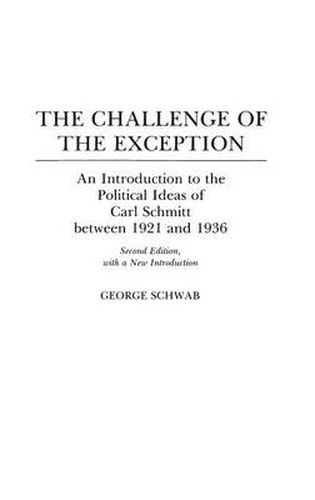Readings Newsletter
Become a Readings Member to make your shopping experience even easier.
Sign in or sign up for free!
You’re not far away from qualifying for FREE standard shipping within Australia
You’ve qualified for FREE standard shipping within Australia
The cart is loading…






This book discusses the ideas of Carl Schmitt, a leading political theorist and jurist who influenced the thoughts of, among others, Hannah Arendt, Carl Joachim Friedrich, Otto Kirchheimer, Hans Morgenthau, Franz Neumann and Leo Strauss. Professor Schwab aims to articulate Schmitt’s key concepts and relate their centrality to politics and the state, to the political theory of liberalism, democracy and authoritarianism, and to international relations. When Schwab treats Schmitt’s interpretations of constitutional questions, for example, he intends to show how political theory in Germany is inextricably linked with constitutional law, legal theory and the country’s history. The book deals with Schmitt’s contributions to 20th century thought and Schwab considers the unconscionable compromises that he made with the 3rd Reich. This, however, failed to help him become the political and legal theorist of Hitler’s Germany. Schwab shows how the new Schmitt was suspect from the beginning and, by 1936, Schmitt the hunter has become Schmitt the hunted.
$9.00 standard shipping within Australia
FREE standard shipping within Australia for orders over $100.00
Express & International shipping calculated at checkout
This book discusses the ideas of Carl Schmitt, a leading political theorist and jurist who influenced the thoughts of, among others, Hannah Arendt, Carl Joachim Friedrich, Otto Kirchheimer, Hans Morgenthau, Franz Neumann and Leo Strauss. Professor Schwab aims to articulate Schmitt’s key concepts and relate their centrality to politics and the state, to the political theory of liberalism, democracy and authoritarianism, and to international relations. When Schwab treats Schmitt’s interpretations of constitutional questions, for example, he intends to show how political theory in Germany is inextricably linked with constitutional law, legal theory and the country’s history. The book deals with Schmitt’s contributions to 20th century thought and Schwab considers the unconscionable compromises that he made with the 3rd Reich. This, however, failed to help him become the political and legal theorist of Hitler’s Germany. Schwab shows how the new Schmitt was suspect from the beginning and, by 1936, Schmitt the hunter has become Schmitt the hunted.